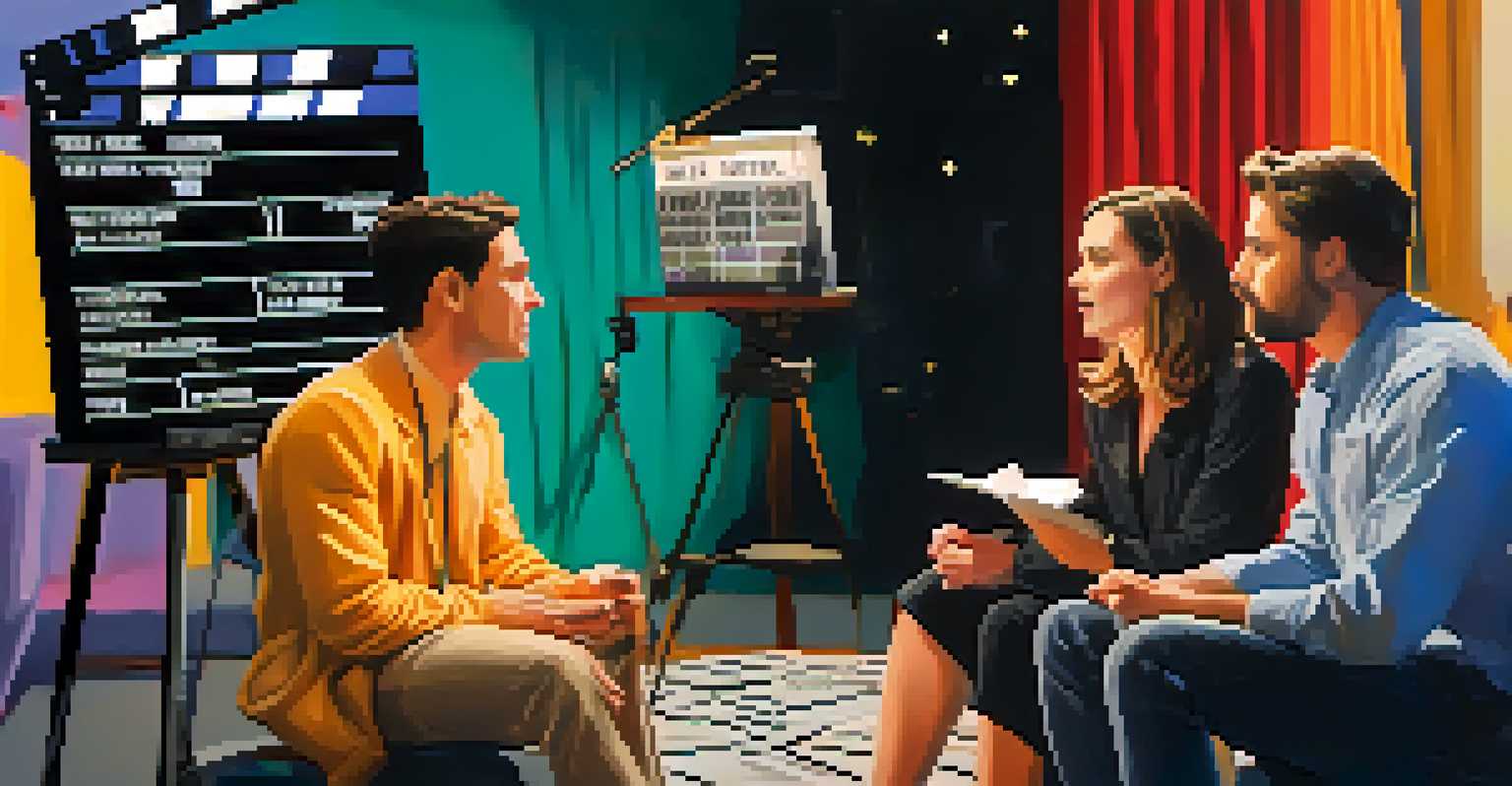Hollywood's Influence on Mental Health Awareness in Media

The Rise of Mental Health Narratives in Film and TV
In recent years, Hollywood has increasingly embraced mental health narratives in film and television. This shift is significant as it helps to normalize conversations around mental health issues, making them more accessible to audiences. Shows and movies are now portraying characters with mental health challenges, allowing viewers to see their struggles reflected on screen.
The greatest gift you can give someone is your time, your attention, your love, and your concern.
For instance, series like '13 Reasons Why' and films such as 'Silver Linings Playbook' delve into the complexities of mental illness, providing viewers with both entertainment and education. These narratives often resonate deeply with audiences, fostering empathy and understanding. By showcasing these issues, Hollywood is playing a pivotal role in changing perceptions about mental health.
Moreover, this trend encourages viewers to seek help and discuss their own experiences. As more stories come to light, the stigma surrounding mental health continues to diminish, paving the way for more open discussions in society.
Celebrity Advocacy: Shaping Public Perception
Celebrities have a unique platform that can significantly influence public perception of mental health. When well-known figures openly discuss their own mental health struggles, it can inspire fans to seek help and share their experiences. For example, stars like Dwayne 'The Rock' Johnson and Lady Gaga have been vocal about their battles with anxiety and depression.

Their honesty not only humanizes these issues but also demonstrates that even those who seem invincible can face mental health challenges. This kind of advocacy encourages fans to realize they are not alone in their struggles, fostering a sense of community and support.
Mental Health Narratives Rise
Hollywood is increasingly portraying mental health issues, helping to normalize conversations and foster empathy.
Furthermore, celebrities often partner with mental health organizations, amplifying their messages and reaching wider audiences. Their influence can lead to increased awareness, funding for research, and resources for those in need, ultimately making a positive impact on mental health initiatives.
Diversity and Representation in Mental Health Stories
Diversity in storytelling is crucial for a comprehensive understanding of mental health. Hollywood has started to recognize the importance of representing various cultures, experiences, and identities, which enriches the narrative landscape. When diverse characters experience mental health issues, it helps break down barriers and challenges stereotypes.
Mental health is not a destination, but a process. It's about how you drive, not where you're going.
For instance, films like 'Crazy Rich Asians' and 'The Farewell' showcase mental health issues within specific cultural contexts, offering viewers a broader perspective. This representation is vital for audiences who may see themselves in these stories, making it easier for them to relate and seek help.
Moreover, diverse narratives can foster dialogue about mental health in different communities, promoting understanding and acceptance. As Hollywood continues to embrace inclusivity, it opens doors for more authentic conversations around mental health.
The Role of Humor in Addressing Mental Health
Humor can be a powerful tool in discussing mental health, and Hollywood has skillfully used it to tackle serious topics. Comedies like 'The Good Place' and 'BoJack Horseman' blend humor with poignant commentary on mental health issues. This approach not only entertains but also encourages viewers to reflect on their own experiences.
By incorporating humor, these shows create a safe space for audiences to engage with difficult subjects. It allows people to laugh while also acknowledging the seriousness of mental health challenges, making it less daunting to talk about.
Celebrities Advocate for Change
Famous figures discussing their mental health struggles inspire fans to seek help and reduce stigma.
This balance between comedy and seriousness can help destigmatize mental health conversations. As viewers laugh and relate to characters, they may feel encouraged to seek help or discuss their own struggles with others.
Impact of Streaming Services on Mental Health Content
The rise of streaming services has transformed how mental health is portrayed in media. Platforms like Netflix, Hulu, and Amazon Prime have invested in original content that addresses mental health issues more openly and diversely. This shift allows creators to explore complex narratives without the constraints often found in traditional media.
For example, shows like 'Atypical' and 'This Is Us' delve into mental health themes with depth and nuance, reaching a broad audience. The accessibility of streaming services means that viewers can find content that resonates with their experiences, leading to increased awareness and understanding.
Moreover, the ability to binge-watch these shows facilitates deeper engagement with the material. Audiences can immerse themselves in the characters' journeys, fostering empathy and prompting discussions about mental health in their own lives.
The Role of Social Media in Mental Health Awareness
Social media plays a crucial role in amplifying mental health awareness, with Hollywood figures often leading the charge. Platforms like Instagram, Twitter, and TikTok allow celebrities to share personal stories, resources, and messages of support directly with their followers. This accessibility fosters a sense of community among those struggling with mental health issues.
For instance, campaigns like #BellLetsTalk have gained traction, encouraging conversations around mental health and reducing stigma. By leveraging the power of social media, Hollywood can reach millions and inspire positive change at a grassroots level.
Diversity Enhances Mental Health Stories
Inclusive storytelling in film and TV provides broader perspectives on mental health, promoting understanding across cultures.
Additionally, social media serves as a platform for advocacy groups to share vital information and resources. This digital space not only informs the public but also empowers individuals to speak up about their mental health experiences.
Future Directions for Mental Health in Hollywood
Looking ahead, the future of mental health representation in Hollywood appears promising. As the conversation continues to evolve, filmmakers and writers are increasingly aware of the responsibility they hold in shaping public perception. This awareness encourages more authentic storytelling that respects the complexities of mental health.
Furthermore, as audiences demand greater diversity and representation, creators are likely to respond by exploring a wider array of mental health narratives. This evolution could lead to richer, more nuanced portrayals that resonate with various demographics and experiences.

Ultimately, Hollywood has the potential to continue driving change in mental health awareness. By prioritizing authentic narratives and supporting mental health initiatives, the industry can play a critical role in fostering understanding and compassion in society.